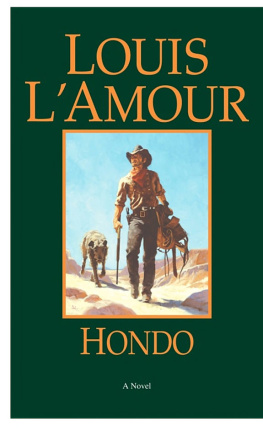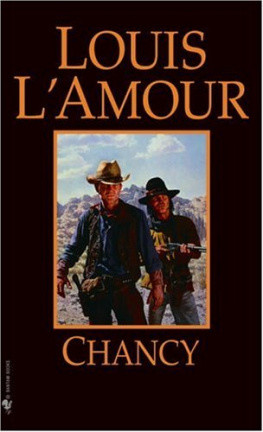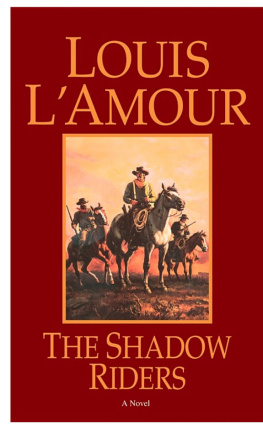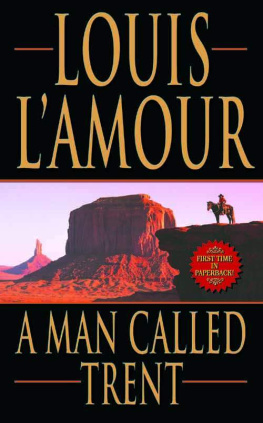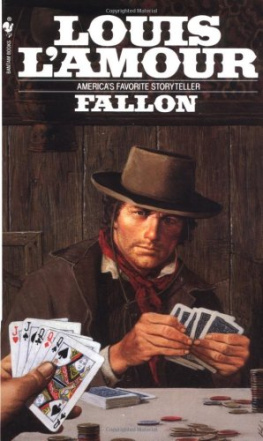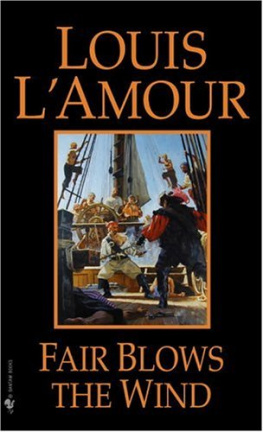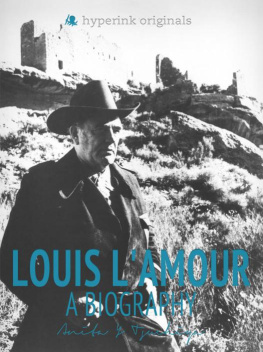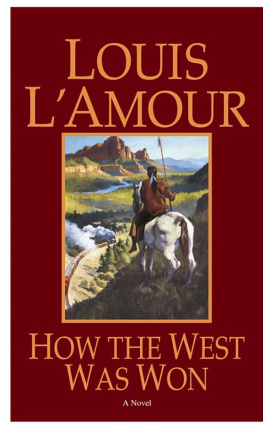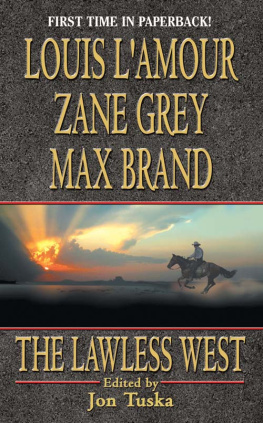Louis LAmour - West of the Tularosa
Here you can read online Louis LAmour - West of the Tularosa full text of the book (entire story) in english for free. Download pdf and epub, get meaning, cover and reviews about this ebook. year: 2010, publisher: Dorchester Publishing Co., Inc., genre: Detective and thriller. Description of the work, (preface) as well as reviews are available. Best literature library LitArk.com created for fans of good reading and offers a wide selection of genres:
Romance novel
Science fiction
Adventure
Detective
Science
History
Home and family
Prose
Art
Politics
Computer
Non-fiction
Religion
Business
Children
Humor
Choose a favorite category and find really read worthwhile books. Enjoy immersion in the world of imagination, feel the emotions of the characters or learn something new for yourself, make an fascinating discovery.
- Book:West of the Tularosa
- Author:
- Publisher:Dorchester Publishing Co., Inc.
- Genre:
- Year:2010
- Rating:3 / 5
- Favourites:Add to favourites
- Your mark:
- 60
- 1
- 2
- 3
- 4
- 5
West of the Tularosa: summary, description and annotation
We offer to read an annotation, description, summary or preface (depends on what the author of the book "West of the Tularosa" wrote himself). If you haven't found the necessary information about the book — write in the comments, we will try to find it.
West of the Tularosa — read online for free the complete book (whole text) full work
Below is the text of the book, divided by pages. System saving the place of the last page read, allows you to conveniently read the book "West of the Tularosa" online for free, without having to search again every time where you left off. Put a bookmark, and you can go to the page where you finished reading at any time.
Font size:
Interval:
Bookmark:

Louis Dearborn LaMoore (19081988) was born in Jamestown, North Dakota. He left home at fifteen and subsequently held a wide variety of jobs although he worked mostly as a merchant seaman. From his earliest youth, LAmour had a love of verse. His first published work was a poem, The Chap Worth While, appearing when he was eighteen years old in his former hometowns newspaper, the Jamestown Sun. It is the only poem from his early years that he left out of SMOKE FROM THIS ALTAR, which appeared in 1939 from Lusk Publishers in Oklahoma City, a book which LAmour published himself; however, this poem is reproduced in THE LOUIS LAMOUR COMPANION (Andrews and McMeel, 1992) edited by Robert Weinberg. LAmour wrote poems and articles for a number of small circulation arts magazines all through the early 1930s and, after hundreds of rejection slips, finally had his first story accepted, Anything for a Pal in True Gang Life (10/35). He returned in 1938 to live with his family where they had settled in Choctaw, Oklahoma, determined to make writing his career. He wrote a fight story bought by Standard Magazines that year and became acquainted with editor Leo Margulies, who was to play an important rle later in LAmours life. The Town No Guns Could Tame in New Western (3/40) was his first published Western story.
During the Second World War LAmour was drafted and ultimately served with the U.S. Army Transportation Corps in Europe. However, in the two years before he was shipped out, he managed to write a great many adventure stories for Standard Magazines. The first story he published in 1946, the year of his discharge, was a Western, Law of the Desert Born in Dime Western (4/46). A talk with Leo Margulies resulted in LAmours agreeing to write Western stories for the various Western pulp magazines published by Standard Magazines, a third of which appeared under the byline Jim Mayo, the name of a character in LAmours earlier adventure fiction. The proposal for LAmour to write new Hopalong Cassidy novels came from Margulies, who wanted to launch Hopalong Cassidys Western Magazine to take advantage of the popularity William Boyds old films and new television series were enjoying with a new generation. Doubleday & Company agreed to publish the pulp novelettes in hard cover books. LAmour was paid $500 a story, no royalties, and he was assigned the house name Tex Burns. LAmour read Clarence E. Mulfords books about the Bar-20 and based his Hopalong Cassidy on Mulfords original creation. Only two issues of the magazine appeared before it ceased publication. Doubleday felt that the Hopalong character had to appear exactly as William Boyd did in the films and on television and thus the novels in book form had to be revamped to meet with this requirement prior to publication.
LAmours first Western novel under his own byline was Westward the Tide (Worlds Work, 1950). It was rejected by every American publisher to which it was submitted. Worlds Work paid a flat 75 without royalties for British Empire rights in perpetuity. LAmour sold his first Western short story to a slick magazine a year later, The Gift of Cochise in Colliers (7/5/52). Robert Fellows and John Wayne purchased screen rights to this story from LAmour for $4,000 and James Edward Grant, one of Waynes favorite screenwriters, developed a script from it, changing LAmours Ches Lane to Hondo Lane. LAmour retained the right to novelize Grants screenplay, which differs substantially from his short story, and he was able to get an endorsement from Wayne to be used as a blurb, stating that Hondo was the finest Western Wayne had ever read. Hondo (Fawcett Gold Medal, 1953) by Louis LAmour was released on the same day as the film, Hondo (Warner, 1953), with a first printing of 320,000 copies.
With Showdown at Yellow Butte (Ace, 1953) by Jim Mayo, LAmour began a series of short Western novels for Don Wollheim that could be doubled with other short novels by other authors in Ace Publishings paperback two-fers. Advances on these were $800 and usually the author never earned any royalties. Heller with a Gun (Fawcett Gold Medal, 1955) was the first of a series of original Westerns LAmour had agreed to write under his own name following the success for Fawcett of Hondo. LAmour wanted even this early to have his Western novels published in hard cover editions. He expanded Guns of the Timberland by Jim Mayo in West (9/50) for Guns of the Timberlands (Jason Press, 1955), a hard cover Western for which he was paid an advance of $250. Another novel for Jason Press followed and then Silver Caon (Avalon Books, 1956) for Thomas Bouregy & Company.
The great turn in LAmours fortunes came about because of problems Saul David was having with his original paperback Westerns program at Bantam Books. Fred Glidden had been signed to a contract to produce two original paperback Luke Short Western novels a year for an advance of $15,000 each. It was a long-term contract but, in the first ten years of it, Fred only wrote six novels. Literary agent Marguerite Harper then persuaded Bantam that Freds brother, Jon, could help fulfill the contract and Jon was signed for eight Peter Dawson Western novels. When Jon died suddenly before completing even one book for Bantam, Harper managed to engage a ghost writer at the Disney studios to write these eight Peter Dawson novels, beginning with The Savages (Bantam, 1959). They proved inferior to anything Jon had ever written and what sales they had seemed to be due only to the Peter Dawson name.
Saul David wanted to know from LAmour if he could deliver two Western novels a year. LAmour said he could, and he did. In fact, by 1962 this number was increased to three original paperback novels a year. The first LAmour novel to appear under the Bantam contract was Radigan (Bantam, 1958).
Yet I feel that some of Louis LAmours finest work is to be found in his early magazine fiction. Several of those stories are collected here, reprinted as they first appeared, and possessing the characteristics in purest form that I suspect account in largest measure for the loyal following Louis LAmour won from his readers: the young male hero who is in the process of growing into manhood and who is evaluating other human beings and his own experiences; a resourceful frontier woman who has beauty as well as fortitude; and the powerful, romantic, strangely compelling vision of the American West that invests LAmours Western fiction and makes it such a delightful escape from the cares of a later timein this authors words, that big country needing big men and women to live in it and where there was no place for the frightened or the mean.
Ma Redlin looked up from the stove. Wheres Sam? He still out yonder?
Johnny rubbed his palms on his chaps. He aint comin to supper, Ma. He done rode off.
Pa and Else were watching him, and Johnny saw the hard lines of temper around Pas mouth and eyes. Ma glanced at him apprehensively, but when Pa did not speak, she looked to her cooking. Johnny walked around the table and sat down across from Else.
When Pa reached for the coffeepot, he looked over at Johnny. Was he alone, boy? Or did he ride off with that no-account Albie Bower?
It was in Johnny neither to lie nor to carry tales. Reluctantly he replied: He was with somebody. I reckon I couldnt be sure who it was.
Redlin snorted and put down his cup. It was a sore point with Joe Redlin that his son and only child should take up with the likes of Albie Bower. Back in Pennsylvania and Ohio the Redlins had been good God-fearing folk, while Bower was no good, and came from a no-good outfit. Lately he had been flashing money around, but he claimed to have won it gambling at Degners Four Star Saloon.
Font size:
Interval:
Bookmark:
Similar books «West of the Tularosa»
Look at similar books to West of the Tularosa. We have selected literature similar in name and meaning in the hope of providing readers with more options to find new, interesting, not yet read works.
Discussion, reviews of the book West of the Tularosa and just readers' own opinions. Leave your comments, write what you think about the work, its meaning or the main characters. Specify what exactly you liked and what you didn't like, and why you think so.


